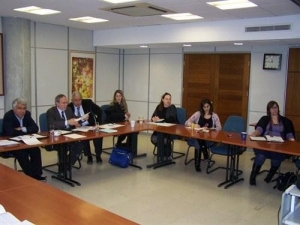SUSTAIN project: second 10 days visit of the expert of TEDK Chios to Cyprus – 30/11/2011
In the framework of the SUSTAIN project, the expert of TEDK Chios, Mr. Vasilis Kampouras, visited Cyprus from 20 to 26 November. The visit took place following the previous visit of the expert, which was held from 9 to 19 May, when Mr. Kampouras met representatives of Cypriot Municipalities, in order for him to assess the situation in each one of them, regarding their participation in European programmes and especially, in the “Europe for Citizens” programme.
Applying the expert’s methodology, which has been proven to be effective in his first visit, this time three nationwide meetings have been organised, gathering representatives of Municipalities, including Mayors, Municipal Secretaries and officers. The first meeting has been organized on November 23rd in the Municipality of Limassol and has been attended by representatives from the Municipalities of Limassol and Paphos districts. On November 24th, the second meeting has been held in the Municipality of Strovolos, attended by representatives of the Municipalities of Nicosia district and of the Occupied Municipalities of Cyprus, while on November 25th the third meeting which took place in the Municipality of Larnaca has been attended by representatives of the Municipalities of Larnaca and Famagusta districts.
During these meetings, Mr. Kampouras presented the main points of the “Study reflecting the current situation of Cypriot Municipalities, regarding the use of Town Twinning and other European programmes”. The Study presents in detail both the problems identified by the expert during his first visit, as well as his suggestions and proposals to the Municipalities in order for them to resolve these problems and improve their performance in the use of Town Twinning and other European programmes.
In his presentation, Mr. Kampouras, said that the Municipalities of Cyprus can be divided into three main categories depending on their characteristics in relation to the use of Town Twinning and other European Programmes:
a) large and active Municipalities,
b) small Municipalities with limited experience and
c) Occupied Municipalities.
As Mr. Kampouras said, all the Municipalities, regardless of their category, have to face -more or less- the same problems:
- All Municipalities receive the information material sent to them by the Brussels Office of the Union of Cyprus Municipalities, but this material is not adequately disseminated within the Municipalities (per section/department or per person).
- So far, none of the Municipalities has pursued or created synergies and wider partnerships or coordinated efforts, neither with other Cypriot Municipalities nor with the Union of Cyprus Municipalities.
- Usually there is no clear vision from the Municipalities (at political / Municipal Council level) on their approach to Town Twinning and other European programmes.
- There is (bigger or smaller depending on the Municipality) understaffing and underemployment of personnel that has the defined responsibility to work on European programmes. The extend of this problem has diminished in the last years.
- Very often, the increased workload is “pushing” down the priority for the use of European programmes. The everyday routine comes first, leaving behind in the agenda, equally important but still more general and long-term issues that could be solved through European funding.
- Poor knowledge of the English language and terminology in a large proportion of the officers and sections who are potentially involved in European and international actions.
- Poor knowledge of the European programmes and their usefulness by elected and senior executives, e.g. the Heads of Departments.
- Reluctance to participate in European projects, especially when there is a previous bad experience.
- Difficulty to access information on European programmes and calls for proposals.
- Usually there is not enough time for submitting a proposal in order to participate in a European programme, as there is no long-term planning to ensure the timely detection and identification of appropriate opportunities. Moreover, the required workflow for preparing a proposal or participating in the projects of other partners (proper use of partner searches) is often huge or is liable to fail at any moment because of the existence of many different intermediaries (a lot of departments involved, need for approval by the Municipal Council, etc.), which do not always understand the process.
- Lack of sufficient knowledge among officers, regarding the needs of their Municipality and the long-term operational planning (e.g. 5-year term).
- Problems in the implementation of the projects, concerning the cooperation with other partners, the effective supervision of outsourced services and services in general, compliance with the time schedule, financial management, timely and satisfying absorption of resources and proper treatment of the subsequent administrative and management controls.
- Coordination and collaboration problems between the involved internal departments of the Municipalities or with the Municipal decision making centres.
- The project results are often not disseminated to the general public. Instead, they are even underused by the departments of the Municipalities and they often remain in the drawers of the services that have implemented them, without adding further value to the overall operation of the Municipalities. Moreover, no attention has been given to the involvement of citizens to projects, in order to ensure their maximum acceptance and use.
- Deficiencies finally exist in the standardization of the procedures and the “automation” of services, as well as in finding and implementing a case by case effective methodology. This is mainly due to the lack of experience in this area.

